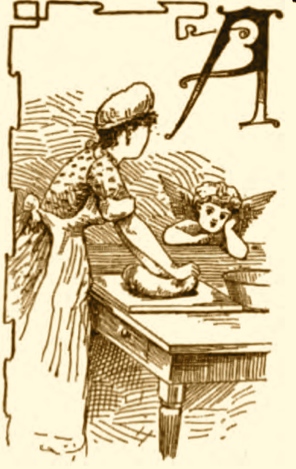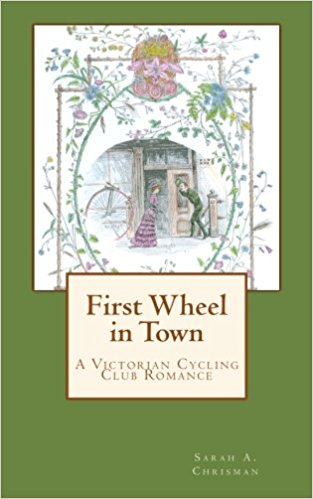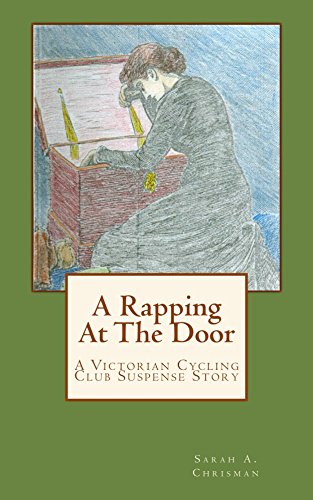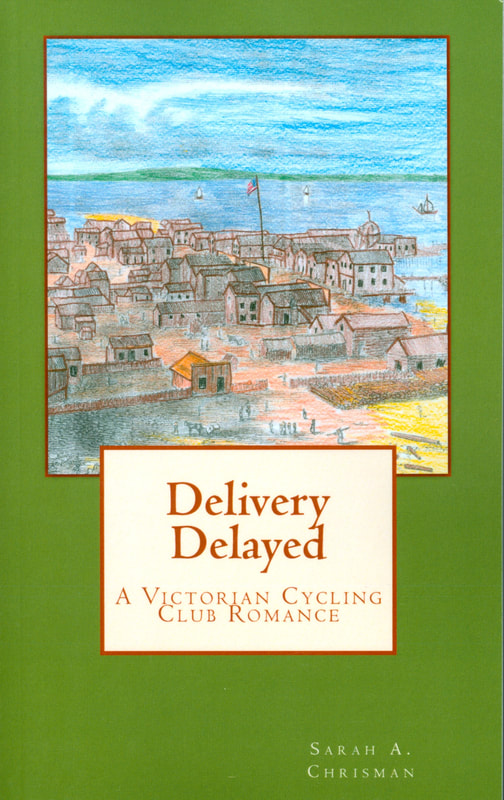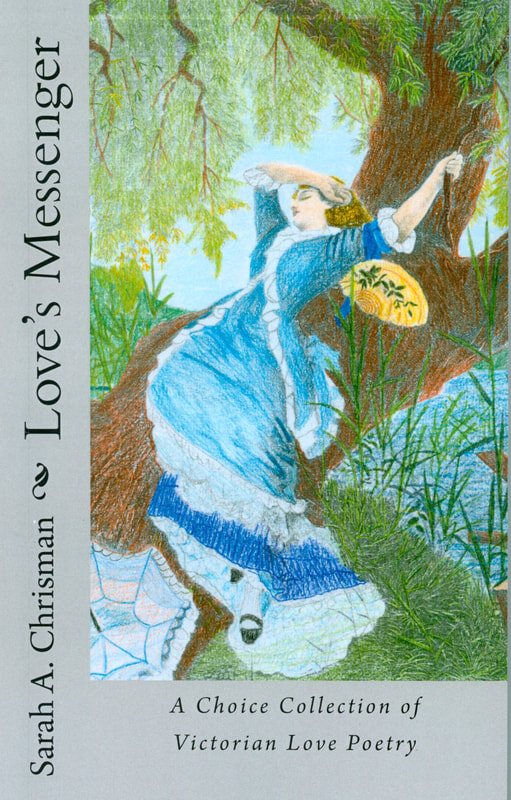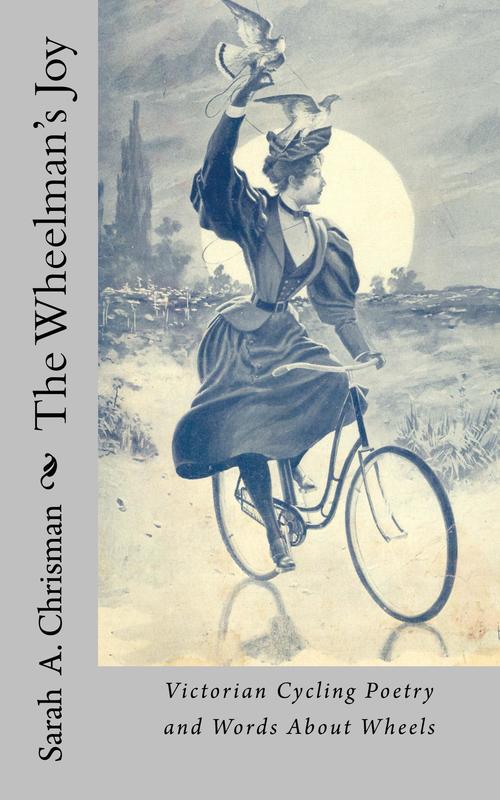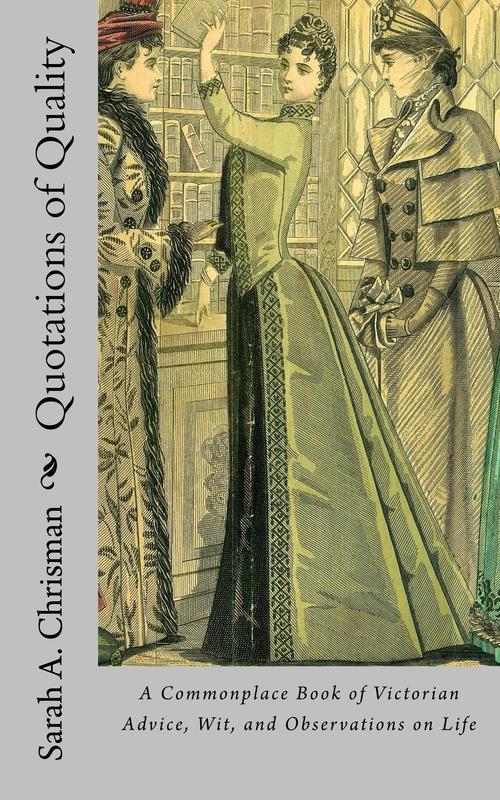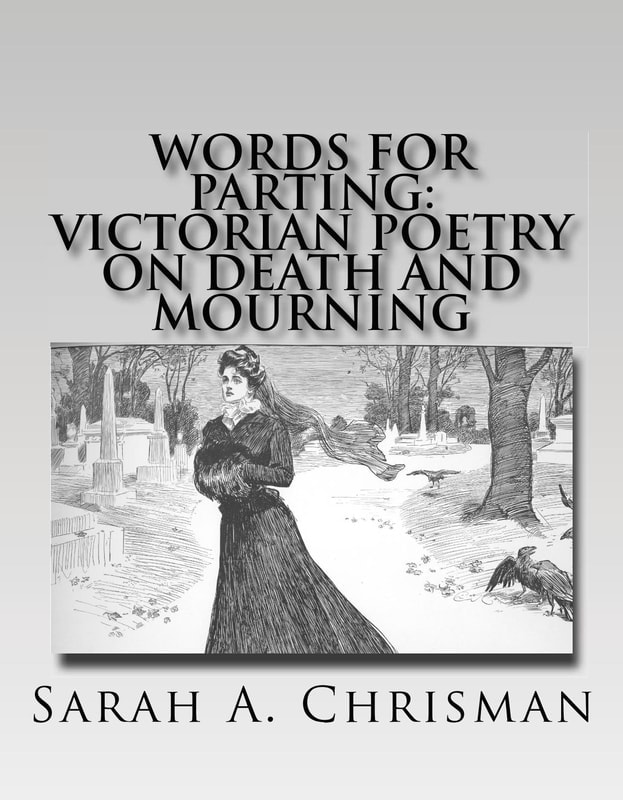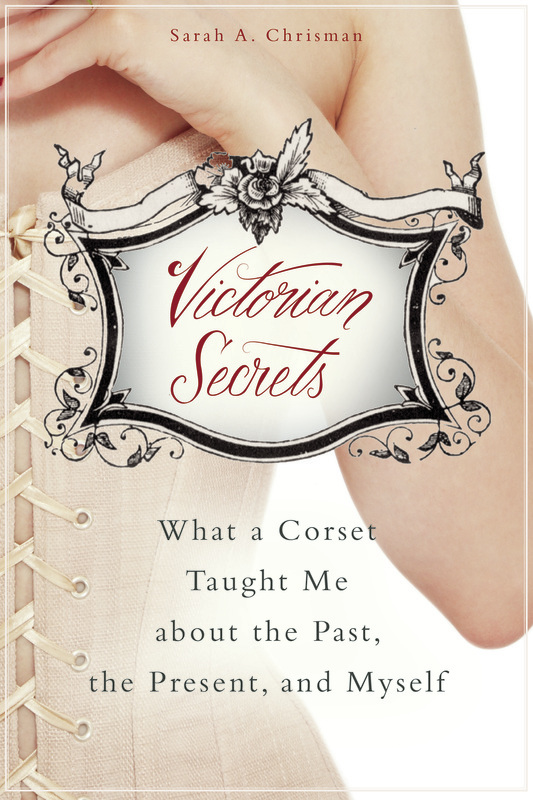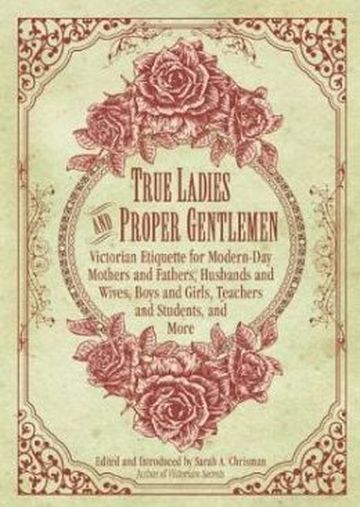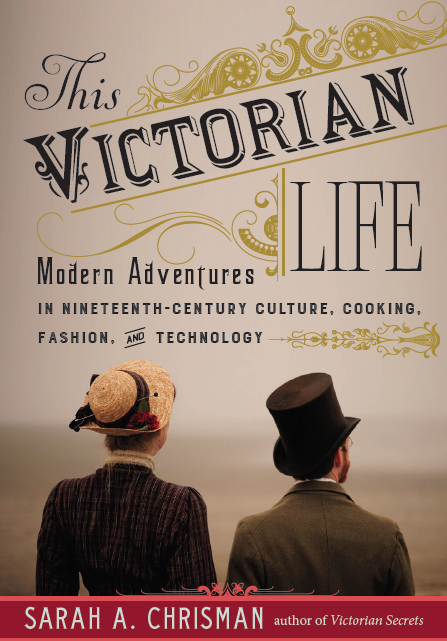Maintaining this website (which you are enjoying for free!) takes a lot of time and resources.
Please show your support for all our hard work by telling your friends about Sarah's books —and by buying them yourself, too, of course!
Historical piece
Kitchen Love and Loyalty
The Cook and Coachman in Masquerade
By Carlotta Perry
Good Housekeeping, July 21, 1888. pp. 124-125.
A very pretty Irish girl was my one domestic, Katie McCarty, very pink and white as to complexion, very plump as to figure, blue eyed, black haired, trim, tidy, and without a rival in the art and science of broiling a steak, making coffee, sweeping, dusting and setting a room to rights. She was only six months over from Ireland when she came to my door; but she had evidently had good training somewhere, and had profited by it. She had not reigned long in my kitchen before the butcher's man and the grocer lingered a little as they delivered parcels, and the coachman cast admiring glances at her as she opened the door when his "missus" made her calls. In fact, one of the first coachmen in the ward, one who wore the most elegant livery, and drove the finest turnout in the most distinguished manner openly expressed his admiration at Christmas time by a card of very magnificent proportions and a bottle of very pronounced perfumery. The stout young butcher declared to her one day, that he sent the tenderest cuts in his shop to us all for her sake. Clearly Katie could have been quite a belle in her own circle had she chosen; but she seemed to have little inclination for the distinction.
For in spite of Katie's blithe manner, and she carried a cheery face, there seemed to lurk a shadow of something like sorrow in her blue eyes; there was a look that made me think of that in the face of Evangeline.
The smile of derision with which this statement was received by the head of the house would have quite demolished any one less positive than I. In the eyes of my friends I was the veriest dreamer, a romancer, who saw what was not there.
In my own estimation I was a woman of remarkable penetration and insight. Circumstances confirmed this view often enough to enable me to keep a fair confidence in my own intuitive powers; occasional failures kept my friends from a like confidence in me.
She was performing some small service in my room one morning, and I was silently admiring the careful dexterity of her movements, when I observed what I thought to be a little extra pensiveness about her. There was a depression in the "set" of her dusting cap that did not escape me.
She was only an Irish servant girl, one of the many who come and go and are forgotten, but she was a woman, friendless, or so I thought, in a strange country. She was a member of my household. It was not idle curiosity that led me to say to her, "Katie, you look a little sad this morning, has anything gone wrong, anything that I can help? You must consider me a friend when you need one."
"Thank you, ma'am," she said, "thank you kindly. It's all along o' the coachman, Patrick McGuire. He's that fond of me ma'am that he'll not be takin' no at all, and that's all the word I can spake to him."
"Patrick McGuire is a worthy young man, is he not?"
"He is that, ma'am."
"Steady and industrious?"
"Sure, he is."
"He is good looking, and pleasant and kind. I heard Mrs. Gray say they never had one they had more confidence in in every way."
"Good looking he is, ma'am, wid a honest eye, and a pleasant smile, and a man to be trusted I've no fear."
"I suppose he has saved up a little money and could give you a comfortable, snug little home, where you could live and be happy with some one who would love you and take good care of you."
"I've heard say he had a little money, an' he loves me, he swears it by the Holy Mother."
"Well, Katie, it is very much to have the love of a good man, to have a pleasant, comfortable home; working hard in your own house, for those who are dear to you, and who loves you, is a vastly better and pleasanter thing than working for even so nice a mistress as I am."
She looked up with a smile and said, "Sure, it's a good mistress that you are; but, ma'am, there's something you haven't said, and it seems strang to me you haven't. You haven't said a word about my lovin' the man. Is it a fair thing to take a man's love and all he can give you, an' give him nothing back for it? Shall a woman sell herself for a roof over her head and a fire to sit by, an' she with two strong hands? It's not Katie McCarthy could do that."
"No, Katie, no woman should do that, but I did not know. And you do not love him?"
"Not a bit, ma'am, I know he is good an' true an' lovin', but my heart is like a stone in my breast even when he says the tinderest things to me, just as cold an' just as heavy."
"And don't you think you might learn to love him?" I asked.
"Learn to love him, is it you say? Sure ma'am, it seems to me the love you have to learn is a poor sort. Seems to me, ma'am, when you have to be botherin' yourself that way just better let it all go. No ma'am, I can't learn to love Patrick McGuire. The love you don't have to learn is the sort you don't forget ma'am, an'—love neither comes nor goes wid the biddin'."
Here the color surged over the girl's face and she sighed.
"There's some one else, Kate."
"The dinner must be put over," she said irrelevantly, and sped away to the kitchen.
With all her frankness she had a reserve that forbade further questioning, so the subject was banished. She grew daily a little quieter in her ways, she sang less at her work, but she was just as faithful in her service, and just as attractive as ever in the eyes of her followers.
One morning she said, "There's to be a maquerade at the rink to-morrow night, ma'am; the coachmen of the city will be giving it. All the nicest girls I know are a goin' and I've said I'd go, though it's little I care about such doin's."
"And are yo;u going with Mr. McGuire as your escort?"
"No, ma'am, two or three of us girls are going togehter ma'am. I'd not be going wid any young man, besides we don't want any one to know us you know."
Very pretty the three Irish girls looked as they stepped into my room the next night to be looked at and admired. Their ideas of costuming in character were not very well defined, or their means for carrying out their ideas were limited, but I did not mar their pleasure by criticism. I let the inconsistencies pass, and said they looked very neatly, which was true.
Katie only had made no attempt at disguise other than the mask. She wore a peculiar looking dress, however, dark gray, long and straight and full, guiltless of tournure, frill or ruffle; around the skirt at the bottom was a deep band of scarlet stuff, a "peasant waist" of the same color, with knots of ribbon matching at the neck and wrists. She looked very pretty, more than pretty, she had a decidedly distinguished look.
After the others had explained to me that they "represinted Winter" and "Mayday" and "The Gipsy Fortune Teller," I said, "Well, Katie, what are you?"
"Nothing but Katie McCarty, ma'am."
"But I've never seen this dress before, did you have it made for the occasion?"
"No, ma'am," said she, "It's one I had before I left old Ireland. I've not had it on since I came to this country, and I thought it would do for to-night, not feeling that I could afford to buy a new one."
"You could not have done better;" and with the silent conviction that is sometimes kinder than we know I bade them good night.
The next morning before i went down to breakfast Katie's voice came up to my ears in song. She had a clear, sweet voice, but this morning there was a new tone in it.
There was a new light in her face, as she passed in and out the dining room. I mentally decided that a little masquerading had done her good.
Afterwards I said to her, "Well, Katie, what is it? there's some reason for the smile in your eyes and the song on your lips this morning. Can't you tell me what it is?"
"Thrue it is, ma'am, an' quare it is that ye can see what is in a woman's heart so quick. I think it must be because yer own heart is so warm an' so kind. Sure I'm the happiest girl in all Ameriky the day."
In her fervor she dropped into the brogue that was rarely a feature in her speech.
"Yis, in Ameriky there's not a girrul so happy an' so grateful to God an' the Blessed Virgin as I am this very minute. O, it was a purty sight there in the ball room, ma'am, wid the lights flashin', an' the music, ah, the music just floated, swelled an' throbbed one minute like it wud lift your hearts right out of all sorrow, an' then it was a sobbin' an' surgin' like the soul that is in the depths of pain and despair, ma'am. It makes one so glad sometimes, such music does, that nothing but tears can tell your gladness, an' so sad too, for it brings back all the sad things that have ever come into your life; so it was with me, ma'am, an' then the strange dresses of the b'ys and girruls. There were kings an' quanes an' knights of the old days, an' fish women, an' gypsies an' the saints know what. An' there was one tall man among the lot that somehow I'd noticed from the first, an' I'd noticed too, that when I wint on to the flure to dance that tall man he would get hisself right in the same set. He hadn't any foolish coshtume, only he wore a mask like the rest of 'em.
"I was just going to dance a mazurky wid Patrick McGuire, an' I've never danced a mazurky nor a polky wid any man in this country, when he came up to us, an' he touched my arrum, an' says he, 'who are ye, anny way?'"
"An' says I, 'who are you?'"
"Then says he, 'don't be triflin'. I saw a woman in a gownd like that onct, an' she had the same swate voice as yerself, an' she danced just as yerself, like the fairies dance on the sod of ould Ireland, an' I've looked for her an' longed for her night an' day since, an' I know if you are that one your own heart will tell you who I am,' says he."
"An' right there ma'am, wid Patrick McGuire shtandin' beside me, an' crookin' his elbow in the elegantest way, for me to go on the dance wid him, what did I do? why ma'am, I just cried out 'O, Tim Haley!' says I."
"An' 'O, Katie McCarty!' says he."
"An there, savin' your presence, ma'am, an' right in the sight of kings an' quanes, an' lords, an' ladies, an' Day an' Night, an' Summer, an' Winter an' the whole quare lot of 'em, I tore the mask off my face, an' he tore the mask off his face, an' he put his arrums around me an' kissed me in a way that wud have brought the tears to your eyes, an' it did to mine, as one wud kiss the lips that they had thought wud never spake lovin' words to them again. He was my own true lover ma'am, that I parted wid in Ireland two long years ago, an' niver a line nore a sign from him since then, though I'd prayed to the saints night an' day."
"How did it happen, Katie?"
"Oh, ma'am, we don't rightly know, but he sent his letters in the care of his cousin, ma'am, an'—well—he was a bit in love wid me, the cousin, more than I knew, and so his letters niver came to me at all, at all, an' I cud not write to him not knowing where in all this great country he might be. Yis the letters was intercipted, just as I've read about in storybooks, an' we both wid achin' hearts the time."
"And he knew you by the dress?"
"Yes, ma'am, the night before he left Ireland I wore that dress at a little party, an' it happened that I never wore it after that 'till last night. It was in the bottom of my chest, an' wheniver I looked at it, it just seemed like the ghost of all my old happiness shtared me in the face an' I could not put the gown on me back. An' I wore it that night becasue it seemed it was just as good masking as anny. It was the coshtume of happiness an' it hid the real Katie McCarty, so I thought; but the saints be praised it brought me great joy.
"No, ma'am, he didn't know I was in this country. I didn't come to find him. I'd not follow anny man, but I came because all the family came an' there was no reason why I should stay behind."
"You have perfect faith that your lover has told you the truth?" I ventured.
How her eyes flashed. "The truth ye say? Will a man tell lies to the woman he loves, d'ye think? An' will man that does not love a woman remember the very gownd she wears when she bade him good bye? Will he know her through her mask by the beatin' an' throbbin of his own heart? Yis, I believe ivery word he said, thank God."
I stood rebuked before her simple faith and said, "I am glad in your gladness, as I am sure you know."
"Cud I ever have told you this, ma'am, if I had not known the warm, lovin' heart of you? Why, I've felt many a time that ye knew that my heart ached; and that ye was sorry for me. O, there's something, an' a quare thing it tis, that tells ye better nor words when ye have found a friend, an' Katie McCarty knows well the signs."
When I said to the head of the house that evening, "Didn't I tell you that there was some romance hidden in the pathos of that girl's eyes?" he responded:
"I believe you did, and I am afraid you would rather lose the tidiest, most capable domestic we have had in many a day, than have your intuitions unverified. Own that I am right, now, aren't you glad?"
"I'm glad," I replied "that I am unselfish enough to rejoice in a sister woman's happiness even if it does take her out of my kitchen. I'm very glad that the masquerade brought about such a sweet reality."
"Upon the whole," responded the head of the house thoughtfully, "so am I."
For in spite of Katie's blithe manner, and she carried a cheery face, there seemed to lurk a shadow of something like sorrow in her blue eyes; there was a look that made me think of that in the face of Evangeline.
The smile of derision with which this statement was received by the head of the house would have quite demolished any one less positive than I. In the eyes of my friends I was the veriest dreamer, a romancer, who saw what was not there.
In my own estimation I was a woman of remarkable penetration and insight. Circumstances confirmed this view often enough to enable me to keep a fair confidence in my own intuitive powers; occasional failures kept my friends from a like confidence in me.
She was performing some small service in my room one morning, and I was silently admiring the careful dexterity of her movements, when I observed what I thought to be a little extra pensiveness about her. There was a depression in the "set" of her dusting cap that did not escape me.
She was only an Irish servant girl, one of the many who come and go and are forgotten, but she was a woman, friendless, or so I thought, in a strange country. She was a member of my household. It was not idle curiosity that led me to say to her, "Katie, you look a little sad this morning, has anything gone wrong, anything that I can help? You must consider me a friend when you need one."
"Thank you, ma'am," she said, "thank you kindly. It's all along o' the coachman, Patrick McGuire. He's that fond of me ma'am that he'll not be takin' no at all, and that's all the word I can spake to him."
"Patrick McGuire is a worthy young man, is he not?"
"He is that, ma'am."
"Steady and industrious?"
"Sure, he is."
"He is good looking, and pleasant and kind. I heard Mrs. Gray say they never had one they had more confidence in in every way."
"Good looking he is, ma'am, wid a honest eye, and a pleasant smile, and a man to be trusted I've no fear."
"I suppose he has saved up a little money and could give you a comfortable, snug little home, where you could live and be happy with some one who would love you and take good care of you."
"I've heard say he had a little money, an' he loves me, he swears it by the Holy Mother."
"Well, Katie, it is very much to have the love of a good man, to have a pleasant, comfortable home; working hard in your own house, for those who are dear to you, and who loves you, is a vastly better and pleasanter thing than working for even so nice a mistress as I am."
She looked up with a smile and said, "Sure, it's a good mistress that you are; but, ma'am, there's something you haven't said, and it seems strang to me you haven't. You haven't said a word about my lovin' the man. Is it a fair thing to take a man's love and all he can give you, an' give him nothing back for it? Shall a woman sell herself for a roof over her head and a fire to sit by, an' she with two strong hands? It's not Katie McCarthy could do that."
"No, Katie, no woman should do that, but I did not know. And you do not love him?"
"Not a bit, ma'am, I know he is good an' true an' lovin', but my heart is like a stone in my breast even when he says the tinderest things to me, just as cold an' just as heavy."
"And don't you think you might learn to love him?" I asked.
"Learn to love him, is it you say? Sure ma'am, it seems to me the love you have to learn is a poor sort. Seems to me, ma'am, when you have to be botherin' yourself that way just better let it all go. No ma'am, I can't learn to love Patrick McGuire. The love you don't have to learn is the sort you don't forget ma'am, an'—love neither comes nor goes wid the biddin'."
Here the color surged over the girl's face and she sighed.
"There's some one else, Kate."
"The dinner must be put over," she said irrelevantly, and sped away to the kitchen.
With all her frankness she had a reserve that forbade further questioning, so the subject was banished. She grew daily a little quieter in her ways, she sang less at her work, but she was just as faithful in her service, and just as attractive as ever in the eyes of her followers.
One morning she said, "There's to be a maquerade at the rink to-morrow night, ma'am; the coachmen of the city will be giving it. All the nicest girls I know are a goin' and I've said I'd go, though it's little I care about such doin's."
"And are yo;u going with Mr. McGuire as your escort?"
"No, ma'am, two or three of us girls are going togehter ma'am. I'd not be going wid any young man, besides we don't want any one to know us you know."
Very pretty the three Irish girls looked as they stepped into my room the next night to be looked at and admired. Their ideas of costuming in character were not very well defined, or their means for carrying out their ideas were limited, but I did not mar their pleasure by criticism. I let the inconsistencies pass, and said they looked very neatly, which was true.
Katie only had made no attempt at disguise other than the mask. She wore a peculiar looking dress, however, dark gray, long and straight and full, guiltless of tournure, frill or ruffle; around the skirt at the bottom was a deep band of scarlet stuff, a "peasant waist" of the same color, with knots of ribbon matching at the neck and wrists. She looked very pretty, more than pretty, she had a decidedly distinguished look.
After the others had explained to me that they "represinted Winter" and "Mayday" and "The Gipsy Fortune Teller," I said, "Well, Katie, what are you?"
"Nothing but Katie McCarty, ma'am."
"But I've never seen this dress before, did you have it made for the occasion?"
"No, ma'am," said she, "It's one I had before I left old Ireland. I've not had it on since I came to this country, and I thought it would do for to-night, not feeling that I could afford to buy a new one."
"You could not have done better;" and with the silent conviction that is sometimes kinder than we know I bade them good night.
The next morning before i went down to breakfast Katie's voice came up to my ears in song. She had a clear, sweet voice, but this morning there was a new tone in it.
There was a new light in her face, as she passed in and out the dining room. I mentally decided that a little masquerading had done her good.
Afterwards I said to her, "Well, Katie, what is it? there's some reason for the smile in your eyes and the song on your lips this morning. Can't you tell me what it is?"
"Thrue it is, ma'am, an' quare it is that ye can see what is in a woman's heart so quick. I think it must be because yer own heart is so warm an' so kind. Sure I'm the happiest girl in all Ameriky the day."
In her fervor she dropped into the brogue that was rarely a feature in her speech.
"Yis, in Ameriky there's not a girrul so happy an' so grateful to God an' the Blessed Virgin as I am this very minute. O, it was a purty sight there in the ball room, ma'am, wid the lights flashin', an' the music, ah, the music just floated, swelled an' throbbed one minute like it wud lift your hearts right out of all sorrow, an' then it was a sobbin' an' surgin' like the soul that is in the depths of pain and despair, ma'am. It makes one so glad sometimes, such music does, that nothing but tears can tell your gladness, an' so sad too, for it brings back all the sad things that have ever come into your life; so it was with me, ma'am, an' then the strange dresses of the b'ys and girruls. There were kings an' quanes an' knights of the old days, an' fish women, an' gypsies an' the saints know what. An' there was one tall man among the lot that somehow I'd noticed from the first, an' I'd noticed too, that when I wint on to the flure to dance that tall man he would get hisself right in the same set. He hadn't any foolish coshtume, only he wore a mask like the rest of 'em.
"I was just going to dance a mazurky wid Patrick McGuire, an' I've never danced a mazurky nor a polky wid any man in this country, when he came up to us, an' he touched my arrum, an' says he, 'who are ye, anny way?'"
"An' says I, 'who are you?'"
"Then says he, 'don't be triflin'. I saw a woman in a gownd like that onct, an' she had the same swate voice as yerself, an' she danced just as yerself, like the fairies dance on the sod of ould Ireland, an' I've looked for her an' longed for her night an' day since, an' I know if you are that one your own heart will tell you who I am,' says he."
"An' right there ma'am, wid Patrick McGuire shtandin' beside me, an' crookin' his elbow in the elegantest way, for me to go on the dance wid him, what did I do? why ma'am, I just cried out 'O, Tim Haley!' says I."
"An' 'O, Katie McCarty!' says he."
"An there, savin' your presence, ma'am, an' right in the sight of kings an' quanes, an' lords, an' ladies, an' Day an' Night, an' Summer, an' Winter an' the whole quare lot of 'em, I tore the mask off my face, an' he tore the mask off his face, an' he put his arrums around me an' kissed me in a way that wud have brought the tears to your eyes, an' it did to mine, as one wud kiss the lips that they had thought wud never spake lovin' words to them again. He was my own true lover ma'am, that I parted wid in Ireland two long years ago, an' niver a line nore a sign from him since then, though I'd prayed to the saints night an' day."
"How did it happen, Katie?"
"Oh, ma'am, we don't rightly know, but he sent his letters in the care of his cousin, ma'am, an'—well—he was a bit in love wid me, the cousin, more than I knew, and so his letters niver came to me at all, at all, an' I cud not write to him not knowing where in all this great country he might be. Yis the letters was intercipted, just as I've read about in storybooks, an' we both wid achin' hearts the time."
"And he knew you by the dress?"
"Yes, ma'am, the night before he left Ireland I wore that dress at a little party, an' it happened that I never wore it after that 'till last night. It was in the bottom of my chest, an' wheniver I looked at it, it just seemed like the ghost of all my old happiness shtared me in the face an' I could not put the gown on me back. An' I wore it that night becasue it seemed it was just as good masking as anny. It was the coshtume of happiness an' it hid the real Katie McCarty, so I thought; but the saints be praised it brought me great joy.
"No, ma'am, he didn't know I was in this country. I didn't come to find him. I'd not follow anny man, but I came because all the family came an' there was no reason why I should stay behind."
"You have perfect faith that your lover has told you the truth?" I ventured.
How her eyes flashed. "The truth ye say? Will a man tell lies to the woman he loves, d'ye think? An' will man that does not love a woman remember the very gownd she wears when she bade him good bye? Will he know her through her mask by the beatin' an' throbbin of his own heart? Yis, I believe ivery word he said, thank God."
I stood rebuked before her simple faith and said, "I am glad in your gladness, as I am sure you know."
"Cud I ever have told you this, ma'am, if I had not known the warm, lovin' heart of you? Why, I've felt many a time that ye knew that my heart ached; and that ye was sorry for me. O, there's something, an' a quare thing it tis, that tells ye better nor words when ye have found a friend, an' Katie McCarty knows well the signs."
When I said to the head of the house that evening, "Didn't I tell you that there was some romance hidden in the pathos of that girl's eyes?" he responded:
"I believe you did, and I am afraid you would rather lose the tidiest, most capable domestic we have had in many a day, than have your intuitions unverified. Own that I am right, now, aren't you glad?"
"I'm glad," I replied "that I am unselfish enough to rejoice in a sister woman's happiness even if it does take her out of my kitchen. I'm very glad that the masquerade brought about such a sweet reality."
"Upon the whole," responded the head of the house thoughtfully, "so am I."
Back to Historical Articles Index
***
In a seaport town in the late 19th-century Pacific Northwest, a group of friends find themselves drawn together —by chance, by love, and by the marvelous changes their world is undergoing. In the process, they learn that the family we choose can be just as important as the ones we're born into. Join their adventures in
The Tales of Chetzemoka
To read about the exhaustive research that goes into each book, click on their "Learn More" buttons!
First Wheel in Town:
|
Love Will Find A Wheel:
|
A Rapping At The Door:
|
Delivery Delayed:
|
Wordcraft Collections
***
For words of wit and advice sage,
I hope you'll like my author page!
History lessons, folks who dare,
Please do share it while you're there!
https://www.facebook.com/ThisVictorianLife
Thank you!
If our website has been helpful to you, please consider making a cash donation.
Your generous support helps us maintain this website and continue our outreach, so that we can keep teaching others about the history we love.
Everything helps and is appreciated!
Search this website:
***
